 Petzlover
Petzlover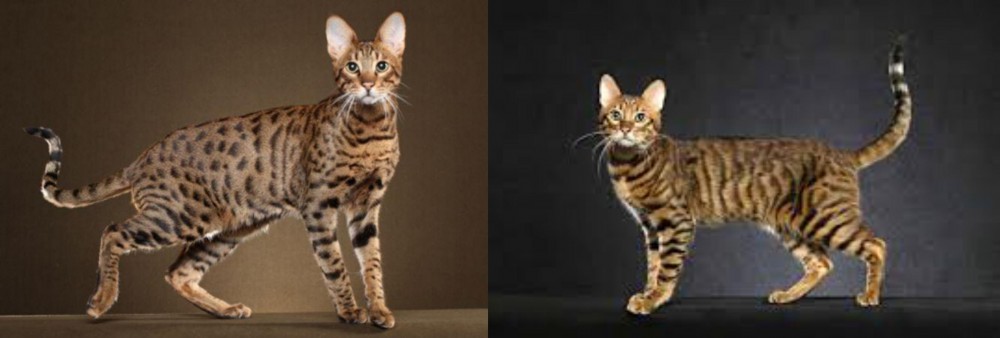 Both Savannah and Serengeti are originated from United States. Both Savannah and Serengeti are having almost same weight. Savannah may live 5 years more than Serengeti. Both Savannah and Serengeti has same litter size. Both Savannah and Serengeti requires Low Maintenance.
Both Savannah and Serengeti are originated from United States. Both Savannah and Serengeti are having almost same weight. Savannah may live 5 years more than Serengeti. Both Savannah and Serengeti has same litter size. Both Savannah and Serengeti requires Low Maintenance.
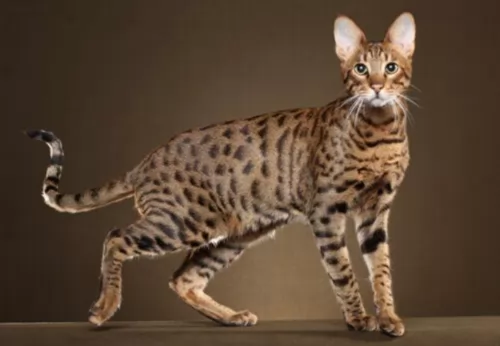 Savannah cats have been bred to look like a Serval but it is essentially a domestic cat. The first Savannah cat was born in the United States in April 1986. The person who was successful in making this happen was Judee Frank.
Savannah cats have been bred to look like a Serval but it is essentially a domestic cat. The first Savannah cat was born in the United States in April 1986. The person who was successful in making this happen was Judee Frank.
She bred a Serval wild cat and a Siamese cat and they produced a female kitten with the name of Savannah – named after the African savannas from where the serval cat comes from.
It will take your Savannah kitten about 3 years to reach his adult size. The Savannah will give birth to up to 6 kittens. The cat was recognized by TICA in 2001.
Today when you’re looking to buy a Savannah kitten, you’ll notice the cats are always described with a filial number, for example, F1, F2, F3, F4, and so on. The filial number describes the generation a cat comes from.
Because this cat belongs to a hybrid group, the feline is banned in a number of states and cities in the United States of America.
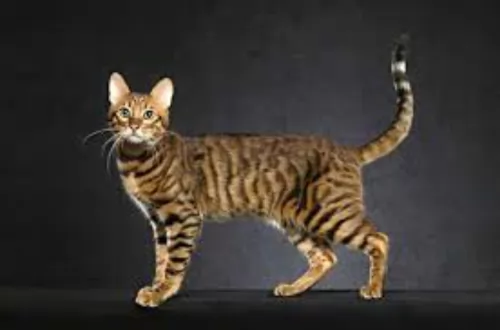 This is a cat breed that was deliberately bred to resemble the Serval cat. It was developed by crossing a Bengal cat and an Oriental Shorthair.
This is a cat breed that was deliberately bred to resemble the Serval cat. It was developed by crossing a Bengal cat and an Oriental Shorthair.
The cat was developed by biologist Karen Sausman in California in 1994. The breed is still under development.
The idea with this hybrid cat was to produce new domestic cat breed that would look like a wild cat but not have the wild characteristics.
The cat is recognized by TICA – The International Cat Association.
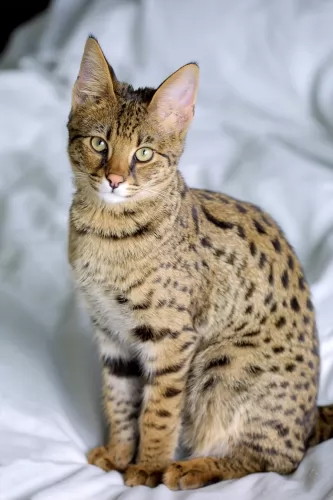 The Savannah Cat is a fairly large cat that weighs anything from 3 to 8 kg. It is a cross between a domestic cat and one of Africa’s smaller wild cats, the Serval.
The Savannah Cat is a fairly large cat that weighs anything from 3 to 8 kg. It is a cross between a domestic cat and one of Africa’s smaller wild cats, the Serval.
Because of the Serval in the mix, the Savannah cat is able to leap into the air too because of his long legs. The cat has a short tail, and similar to the Cheetah has tear markings running from the corner of the eyes down to the whiskers.
A striking feature of this cat is his hooded eyes and the large ears. The Savannah cat has exotic looks and is regarded as a low maintenance cat with its short fur. The coat is tawny-colored with black spots but it comes in 4 background colors – smoke, silver, brown, and black.
An interesting aspect with the Savannah Cat is that they are sometimes compared to dogs. They become loyal pets and companions and will follow their owners around and can even be trained to walk on a leash.
The Savannah is an intelligent cat and can be taught a trick or two. Because the Savannah cat is a hybrid, they aren’t predictable in nature. Some are friendly and social while others are more wild and hostile. Some of them don’t like meeting strangers and will growl and hiss with uncertainty.
They enjoy playing in water and it will be a good idea to invest in a paddling pool for this cat’s outdoor enclosure. It’s an active cat and will require daily exercise. It is better suited to homes where there are older children.
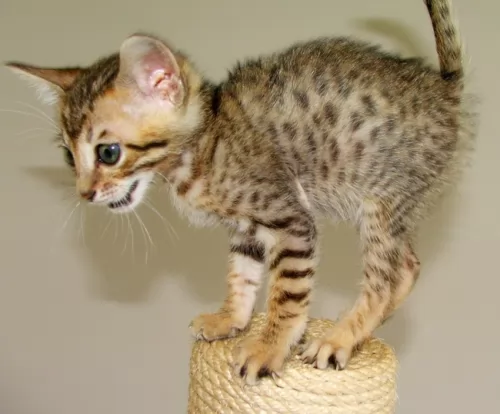 These are spotted cats with long legs and large, round-tipped ears. The neck is long and the body lithe, lean, and muscular.
These are spotted cats with long legs and large, round-tipped ears. The neck is long and the body lithe, lean, and muscular.
They are medium to large in size and can weigh up to 7 or 8kg. The coat is tan and cream with silver or grey coloring as well as black spots and stripes. Some Serengetis appear to be black but on closer look, you see that they have what is known as ‘ghost spotting’ – a black-spotted pattern that can scarcely be seen.
You may even think you are looking at a black panther. The coat is short, silky, smooth, and sleek. The eyes of the cat are round and are usually amber or gold.
The Serengeti is a friendly, social, and confident cat that is quite capable of forming a strong attachment to its human family. It is a loving, loyal cat. The cat can become bored and will need plenty of puzzle toys to keep his mind and body physically active.
You will need to provide him with a scratching post too as he is a lively, energetic cat. This isn’t only an indoor cat. Cats like the Serengeti will need an outdoor enclosure and the Serengeti cat will need branches and perches to leap up onto.
He is an active cat and can become bored if left indoors. They are capable of making a good family pet and are vocal too – telling you all sorts of things.
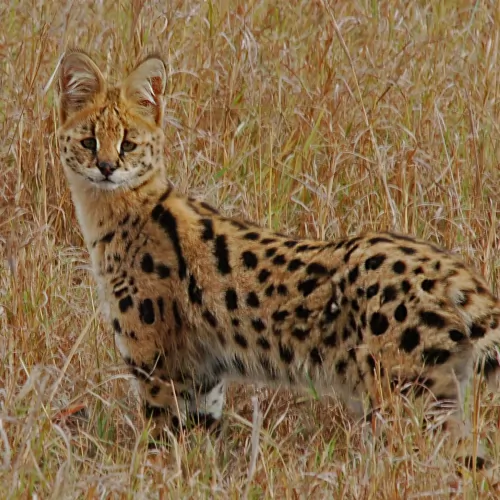 The Savannah cat's temperament is exceptional, and when you’ve got a Savannah in your home, you’ve got a true companion.
The Savannah cat's temperament is exceptional, and when you’ve got a Savannah in your home, you’ve got a true companion.
Cat lovers who have owned one of these cats will tell you that this cat is similar to a dog in many ways. The intelligent cat will follow his owners around and be a friendly, loyal, and devoted companion.
With so much intelligence, beauty, and energy, this cat has all the qualities of a splendid feline companion.
The Savannah will form a particularly strong bond with the human family member who grooms and feeds him.
Everybody who has known the social, affectionate, loyal cat has nothing but good words to say and he may just be the cat companion you want.
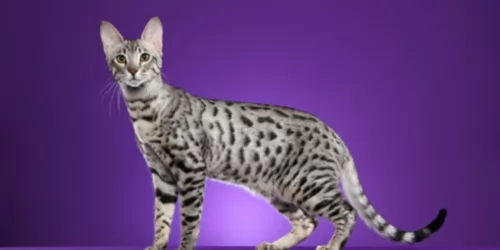 The Serengeti is both a friendly and affectionate cat even though he is a bit shy and overwhelmed in new surroundings.
The Serengeti is both a friendly and affectionate cat even though he is a bit shy and overwhelmed in new surroundings.
He is a cat that talks quite a bit and if he is happy and content he enjoys 'chatting' to you about his day.
He is able to get on well with children in the home as well as with other pets. He is an athletic cat and just loves to climb, and this is why he will certainly need an outdoor enclosure as he loves to dart around madly from time to time, and doing that in your home could be quite dangerous.
He is capable of being a loving cat breed and can form a strong bond with his human family.
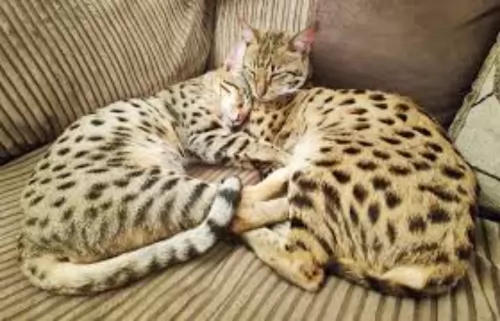 The Savannah is generally a healthy cat. The cat can also fall prey to some of the typical cat illnesses there are -
The Savannah is generally a healthy cat. The cat can also fall prey to some of the typical cat illnesses there are -
Allergies happen with cats when their immune systems become sensitive to certain things. Cat allergies can be environmental, from fleas or from food allergies.
While some allergies may come and go, others will require an examination by the vet as they can include itchy skin problems. Typical allergy symptoms include sneezing and coughing, runny eyes, diarrhea and vomiting.
This is a gastrointestinal disorder. Cats of any age are affected but it is found more in older cats. Chronic inflammation of the gastrointestinal tract can come about because of a food allergy for instance or parasitic or bacterial infection. Your Savannah cat will be vomiting and lethargic and have diarrhea and weight loss.
These are parasites that invade the small intestines of a cat. It can cause anemia and inflammation of the small intestine. Hookworms can produce symptoms such as weight loss, coughing, and diarrhea as well as skin irritations.
This condition causes thickening of the muscular walls of a cat’s heart. The heart’s left ventricle is thickened. The heart can beat rapidly and this results in more oxygen usage. It can also lead to oxygen starvation which causes heart cells to die off. A condition known as arrhythmia develops where the heart beats irregularly.
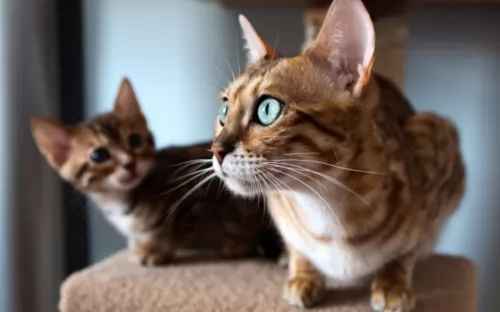 Hybrid Cats such as the Serengeti are a combination of a wild breed and a domestic breed. With good care he can live to be up to 15 years of age and possibly longer.
Hybrid Cats such as the Serengeti are a combination of a wild breed and a domestic breed. With good care he can live to be up to 15 years of age and possibly longer.
Hybrid cats are always controversial because people who have owned them have got both good and bad to say about them. They have some behavioral issues and many of them have an aggressive side, they’re aloof and they refuse to use a litter box. The cat can’t be blamed though because they have that wild side.
They also come with some health issues such as premature birth, miscarriage, diarrhea, and irritable bowel disease. You may just find yourself more often at the vet than you’d like.
You will need to ensure that your Serengeti gets all his vaccines and de-worming treatments.
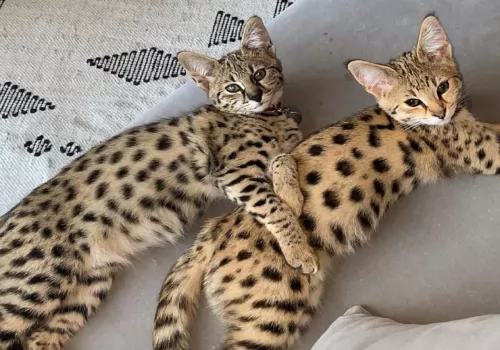 The Savannah cat's diet needs to be a high-quality type of food with efficient levels of protein and taurine. The reason for this is that all cats are carnivores. A properly balanced raw diet will be the best nutritionally balanced food you can provide.
The Savannah cat's diet needs to be a high-quality type of food with efficient levels of protein and taurine. The reason for this is that all cats are carnivores. A properly balanced raw diet will be the best nutritionally balanced food you can provide.
The Savannah has a short coat, which makes him low maintenance. He will still need to be brushed once a week. This will ensure a healthy sheen, and it will remove loose hairs and dust.
Provide for this intelligent cat’s physical and mental stimulation. He will need a variety of interactive toys. You yourself, need to become involved with your feline friend and give him a game too.
Make sure your Savannah is up-to-date with all his vaccinations. If you’re in any doubt about your pet’s health and wellbeing, get him to the vet who can provide you with valuable information on his health and his diet to ensure optimal health for your feline friend.
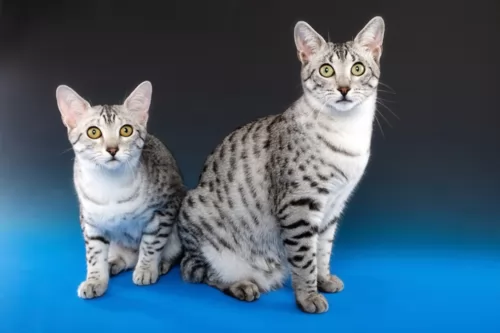 Grooming is easy for the Serengeti as it is a short-haired cat and will require a brush just once a week. Trimming the claws will also be necessary.
Grooming is easy for the Serengeti as it is a short-haired cat and will require a brush just once a week. Trimming the claws will also be necessary.
A cat such as the Serengeti has been developed by crossing the domestic cat with a wild breed. This means that there will be concerns with the temperament and behavior of these cats in a home setting. Apart from being allowed indoors, they will need an outside enclosure.
Having a wild side, while every cat is a carnivore, these cats are even more so. Their diet has to be strictly protein – meat. Wild cats would have a diet made up of birds and lizards. You want to avoid commercial cat foods that are of lower quality and have less meat in and more carbohydrates. This just spells ill health for your cat. Cats also need some fresh raw meat in their diets.
It is important to keep up your Serengeti's veterinary checkups to make sure there aren’t any health concerns.